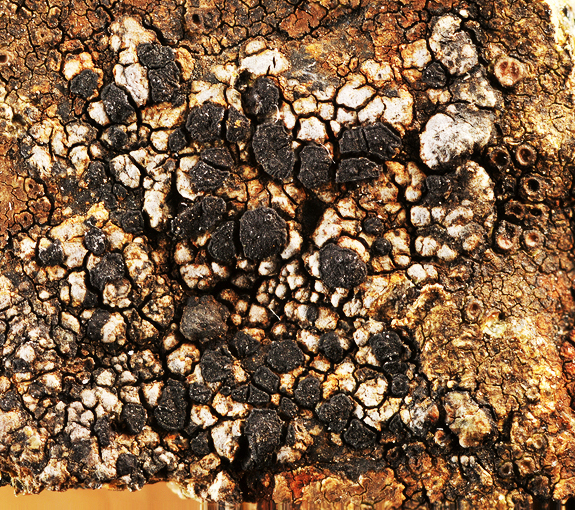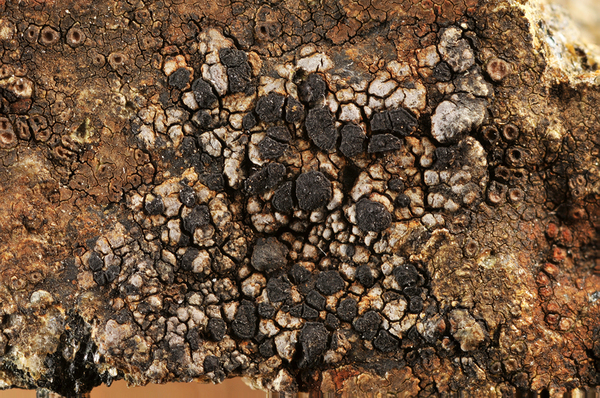Rhizocarpon intersitum Arnold
Verh. zool.-bot. Ges. Wien, 27: 554, 1877.
Synonyms: Rhizocarpon diversisporum Hav.
Description: Thallus crustose, episubstratic, verruculose-areolate, whitish grey, grey or grey-brown, occasionally greenish or pink-tinged, epruinose, forming 2-3 cm wide patches delimited by a black prothallus, the areoles contiguous or dispersed, 0.2-0.6(-0.8) mm wide, smooth, flat to strongly convex, angular or more or less round, smooth. Medulla white, I-. Apothecia lecideine, black, 0.25-0.7(-1) mm across, more or less round, innate among the areoles, with a flat to convex, epruinose disc and a thin, finally excluded proper margin. Proper exciple c. 30 μm thick, dark brown in outer part, paler within, K+ purplish; epithecium greenish brown, K+ intensifying green; hymenium colourless to pale greenish in places, > 100 μmhigh, not inspersed with oil droplets, I+ blue; hypothecium dark brown to dark reddish brown, K-. Asci (4-)8-spored, clavate, fissitunicate, with a well-developed tholus that is K/I- in lower part and K/I+ blue near the apex, lacking an ocular chamber, Rhizocarpon-type. Ascospores submuriform, with 4-8 cells in optical view, soon blackish green, ellipsoid, often slightly curved, 20-33 x 8-12 μm, halonate at least when young. Photobiont chlorococcoid. Spot tests: medulla K- or rarely K+ pale yellow, C-, KC-, P- or P+ faintly orange. Chemistry: without lichen substances, or with variable amounts of stictic acid.
Growth form: Crustose
Substrata: rocks
Photobiont: green algae other than Trentepohlia
Reproductive strategy: mainly sexual
Poorly known taxon in need of further study
Commonnes-rarity: (info)
Alpine belt: very rare
Subalpine belt: very rare
Montane belt: extremely rare
Dry submediterranean belt: absent
Humid submediterranean belt: absent
Padanian area: absent
pH of the substrata:
1 2 3 4 5
Solar irradiation:
1 2 3 4 5
Aridity:
1 2 3 4 5
Eutrophication:
1 2 3 4 5
Poleotolerance:
0 1 2 3
Altitudinal distribution:
1 2 3 4 5 6
Rarity
absent
extremely rare
very rare
rare
rather rare
rather common
common
very common
extremely common
Loading data...
Occurrence data
Predictive map
Growth form: Crustose
Substrata: rocks
Photobiont: green algae other than Trentepohlia
Reproductive strategy: mainly sexual
Poorly known taxon in need of further study
Commonnes-rarity: (info)
Alpine belt: very rare
Subalpine belt: very rare
Montane belt: extremely rare
Dry submediterranean belt: absent
Humid submediterranean belt: absent
Padanian area: absent
pH of the substrata:
| 1 | 2 | 3 | 4 | 5 |
Solar irradiation:
| 1 | 2 | 3 | 4 | 5 |
Aridity:
| 1 | 2 | 3 | 4 | 5 |
Eutrophication:
| 1 | 2 | 3 | 4 | 5 |
Poleotolerance:
| 0 | 1 | 2 | 3 |
Altitudinal distribution:
| 1 | 2 | 3 | 4 | 5 | 6 |
Rarity
absent
extremely rare
very rare
rare
rather rare
rather common
common
very common
extremely common
Loading data...
Occurrence data
Predictive map








